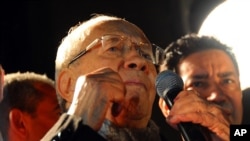Veteran politician and staunch anti-Islamist Beji Caid Essebsi has been elected Tunisia's next president.
Official results give 88-year-old Beji Caid Essebsi nearly 56 percent of the vote in Sunday's runoff election - compared to 44 percent for incumbent interim President Moncef Marzouki. Secularist Essebsi was expected to win the vote - and declared early victory as polls closed on Sunday.
In remarks broadcast by French TV, Essebsi said his election marked the start of Tunisia's future. He said he wanted the nation to move forward united. He also saluted those who voted for his opponent.
The vote closes Tunisia's somewhat rocky transition to democracy, nearly three years after a January revolution ousted long-term dictator Zine el Abidine Ben Ali. The revolt triggered the wider Arab uprisings, that have been marked by chaos, bloodshed and setbacks in many countries.
But Tunisia has moved ahead. This year, it completed a new constitution. It held legislative elections in October that saw Essebsi's secular Nidaa Tounes party emerge with the most votes. It beat the moderate Islamist Ennahda that has been in power for much of this post-revolution transition.
In voting for Essebsi, analyst Anthony Dworkin, of the European Council on Foreign Relations says Tunisians cast a vote for stability.
"I think they went for a figure - after three years of chaos and turmoil in the country, little economic progress, some security problems - I think the attraction for Essebsi and his party is he was someone who could get the ship ... back on course. And that he was a tried and tested hand, and someone who would be able to move things forward," he said.
Essebsi served under both former President Ben-Ali and Tunisia's first post-independence president, Habib Bourguiba. As president, he is responsible for security, defense and foreign affairs. But his party will also command parliament, although it must first seek political alliances to do so.
Looking ahead, analyst Dwokin believed Tunisia needed major reforms of key institutions to consolidate its revolution.
"It's not clear the people around Essebsi and Essebsi himself have that kind of vision. Certainly what we've hear is much more to do with consolidating the state - which perhaps is necessary, but it needs to be consolidated and reformed. And that's the challenge," said Dwokin.
Tunisia also has to heal its division. The presidential campaign was marked by mudslinging on both sides. And the vote was split in ideology - pro- versus anti-Islamists - and geographically. The northern, coastal areas tended to vote for Essebsi, while the south went for Marzouki.
The future of Ennahda, the country's second biggest political party, will also be key in moving forward. It is unlikely Nidaa Tounes will pick Ennahda as a coalition partner. What was essential, analyst Dworkin said, was that the Islamist party retained a legitimate role in the opposition.




